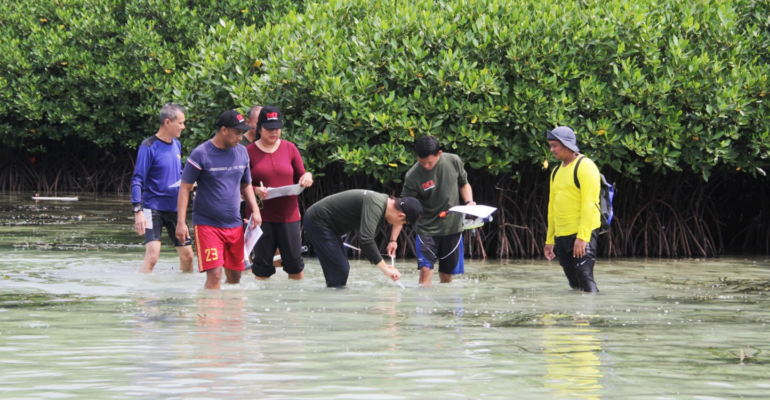PKSPL IPB University and Directorate General of PSDKP KKP Hold Training on CMES Assessment and Valuation 2024

The Center for Coastal and Marine Resources Studies (PKSPL) IPB University held the Training on Coastal and Marine Ecosystem Services (CMES) Assessment and Valuation 2024. This training was held in collaboration with the Directorate General of Marine and Fisheries Resources Superveillance (Ditjen PSDKP), Ministry of Marine Affairs and Fisheries (KKP).
The training was carried out in a hybrid manner with online and offline learning methods. Face-to-face learning and field practice were carried out on Pramuka Island, Seribu Islands Regency, Jakarta.
This activity was attended by 20 participants from various regions from staff at PSDKP Bases and Stations in Indonesia. They came from the Directorate of PPSDK, Lampulo PSDKP Base, Batam, Jakarta, Benoa, Bitung, Tual, and Belawan Cilacap PSDKP Station, Pontianak, Tarakan, Tahuna, Ambon, Kupang and Biak.
Researchers and academics from PKSPL IPB University and the National Research and Innovation Agency (BRIN) were present as resource persons providing theoretical and practical field learning. The materials provided include 1) CMES Theory and Assessment, 2) CMES Assessment: Mangrove, 3) CMES Assessment: Seagrass, 4) CMES Assessment: Coral Reefs, 5) CMES Valuation: Contingent Valuation Method and Choice Experiment.
Not only that, participants also get materials 6) CMES Valuation: Travel Cost Method and Hedonic Price, 7) CMES Valuation: Effect on Productivity, 8) Benefit Transfer and Replacement Cost, 9) Benefit Cost and Analysis, 10) Legal Review in the Practice of Compensation for Damage to Coastal and Marine Ecosystem Services, and 11) Loss and damage.
The practicum consists of subtopics: 1) Determination of areas and identification of coastal and marine resources in economic valuation assessments, 2) Sampling framework: Tools and materials, questionnaires and number of samples, 3) Introduction to field guides and material refreshments, 4) Practicum on collecting coral reef, mangrove, seagrass data, 5) Data processing and analysis, and 6) presentation and discussion.
“In general, the purpose of CMES Assessment and Valuation 2024 is to improve the competence of calculating the valuation of damage to coastal and marine resources for marine supervisors,” said the Chairman of PKSPL IPB University, Prof Yonvitner.
Meanwhile, the specific objective of this training is to provide a basic understanding of the concept and definition of coastal and marine ecosystem assessment, the reciprocal relationship between ecosystems with goods and services and with human resources, and techniques for economic assessment of coastal and marine resources.
“The Training on CMES Assessment and Valuation activity is expected to continue to be implemented to improve the understanding and capabilities of human resources, especially marine and fisheries resource surveillance officers in identifying and collecting data to conduct economic assessments of coastal and marine resources in Indonesia,” he said. (PKSPL/Rz) (IAAS/HNJ)



